The world was now pure and new after the flood, inhabited by righteous people. This devotional reading looks at Noah and his descendants – and how sin reentered the world.
Nuggets
- Because of the faithfulness of Noah’s family, the earth was repopulated by their descendants.
- Even the most righteous human can — and all except Jesus — will sin.
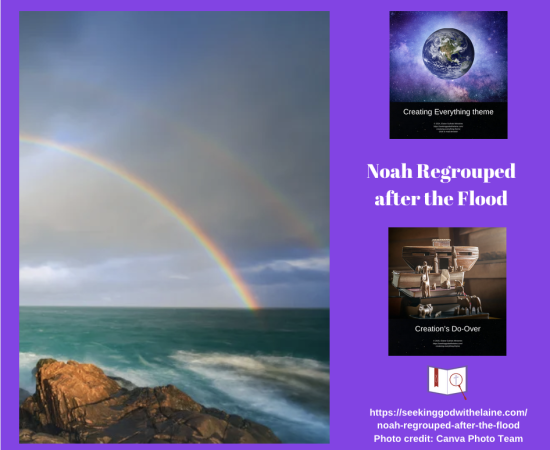
I bet Noah and his family felt really relieved to be off the ark. They had spent a whole year being cooped up with the animals.
Think of how encouraged they may have felt getting started with their new normal. Everything was new and fresh.
It wouldn’t stay that way for long.
Let's Put It into Context
To read devotions in the Creating Everything theme, click the button below.
Devotions in the Creation’s Do-Over series
Noah’s Descendants
“The sons of Noah who came out of the boat with their father were Shem, Ham, and Japheth. (Ham is the father of Canaan.) From these three sons of Noah came all the people who now populate the earth” (Gen. 9: 18-19 NLT)
Because of the faithfulness of Noah’s family, the earth was repopulated by their descendants.
We talked about before whether Noah’s sons and all their wives were righteous, along with Noah. I tend to believe they were.
So, that means that the flood wiped out all sin on the earth, right? Wrong.
Water doesn’t change our spiritual nature. (Nope, baptism doesn’t save is because it has nothing to do with blood.)
Sin was very much still alive and well.
True, they had gotten the promise that there would never be a flood bringing total destruction again. That was what the covenant was all about.
Melvill brought up a good point. He wrote,
“… if this earth were to be again and again the theatre of the same provocations and the same vengeance, it would be hard to say why God spared a remnant, or why He allowed the rebellious race to be continued and multiplied. Yet, however natural it might have been for Noah and his sons to calculate on a moral improvement in the species, it is certain that after the flood, men were just the same fallen creatures that they had been before the flood.”
Resource
Why destroy everything if You were not going to destroy the root problem? Why give the promise there would be no more earth-destroying flood?
Think about it. God told us why He was sending the flood.
- “The Lord observed the extent of human wickedness on the earth, and he saw that everything they thought or imagined was consistently and totally evil” (Gen. 6: 5 NLT).
- “So God said to Noah, ‘I have decided to destroy all living creatures, for they have filled the earth with violence. Yes, I will wipe them all out along with the earth!’” (Gen. 6: 13 NLT).
- They were wicked.
- Their minds and hearts were corrupt.
- They were evil.
- They were violent.
Maybe these eight people were righteous, but their descendants would not always remain so.
So, why promise no more earth-destroying floods? We’ve talked before about how God works through patterns. Why not continue that here?
It is partly because God promised never to destroy the earth again because of humans. “And when the Lord smelled the pleasing aroma, the Lord said in his heart, ‘I will never again curse the ground because of man, for the intention of man’s heart is evil from his youth. Neither will I ever again strike down every living creature as I have done’” (Gen. 8: 21 NLT).
It may have been also because humans hadn’t changed. God punishes us for wickedness, and then we go right back to that wickedness. Sending a flood didn’t work to eliminate sin.
God didn’t want to get on that circular pattern.
No, God couldn’t have done things differently at that point. Time hadn’t been fulfilled to send Jesus as their Savior. He was the only way back to a good relationship with God.
The holy line would come down through Shem. The name signifies the name — in other words, the name of God.
Leale and Hollis didn’t necessarily think that made Shem the new firstborn because Cain and Abel were dead. Leale wrote, “Shem is mentioned first because religion is the chief glory of man, the only source of his true greatness, and the only worthy end of his life.” Shem’s faith developed quicker than the others’ did.
It was Leale’s belief that Japheth also played a significant part in the repopulation of earth. He wrote, “It is represented by Japheth, which signifies ‘enlargement.’ There was in him an energy by which he could overcome obstacles and expand his empire over the world. This spirit of work and enterprise has given birth to civilization.”
Resources
Then here came Ham. He knew right from wrong, but we’ll see in the next devotion that he had a little problem with that.
We not only have to know God, but we must also serve Him. We not only have to know Jesus, but we must also ask Him to be our Lord and Savior.
Knowledge isn’t enough. It must lead to faith and obedience.
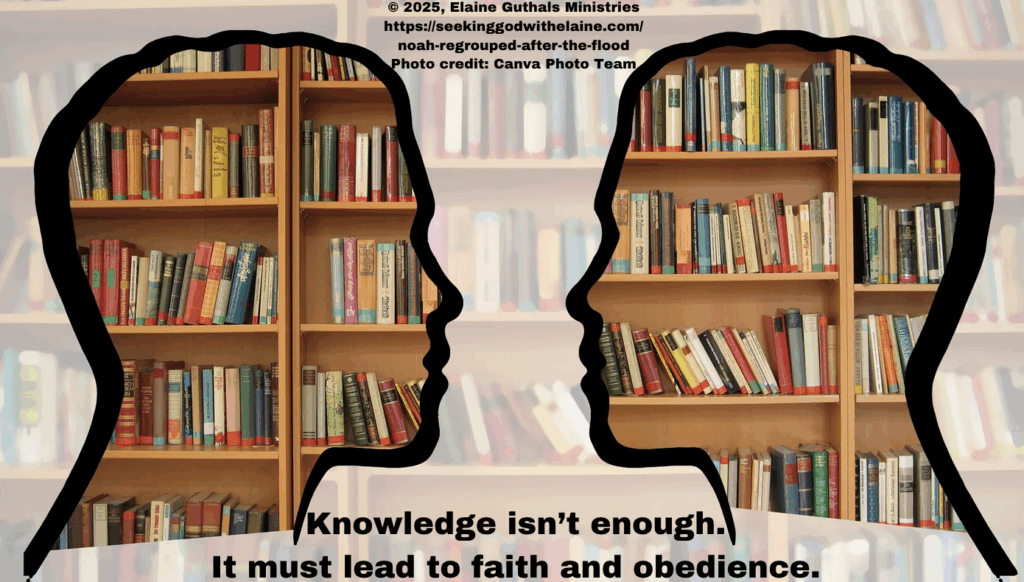
Noah’s Occupation and Sin
“After the flood, Noah began to cultivate the ground, and he planted a vineyard. One day he drank some wine he had made, and he became drunk and lay naked inside his tent” (Gen. 9: 20-21 NLT)
Even the most righteous human can — and all except Jesus — will sin.
We only get Noah’s occupation after the flood. He planted a vineyard.
Before the flood, we were not told Noah’s occupation. We are after the flood. God’s Word says Noah had a vineyard.
The article I read from Genesis for Ordinary People said that Noah was part of the Neolithic agricultural revolution, dated to have occurred from 10,000 BCE to 4,500 BCE. This is where people went from hunter-gatherers to farmers.
Resource
At first, I don’t know if I totally agreed with that. God didn’t give humans the permission to eat animals until after the flood, which is estimated to have occurred ant time between 2518 and 3298 — before the agricultural revolution.
But if eating animals was part of their wickedness before the flood, I can see the hunter part.
This revolution is important because it allowed people to settle and grow their families.
But then, Cain raised crops. “When it was time for the harvest, Cain presented some of his crops as a gift to the Lord” (Gen. 4: 3 NLT). That doesn’t sound like he was a gatherer.
If we go back to the Hebrew, though, that isn’t what it says. “And in ketz yamim [end of days aka harvest] it came to pass, that Kayin [Cain] brought of the p’ri haadamah a minchah [fruit of the ground, produce of the land] unto Hashem [God]” (Gen. 4: 3 OJB)
That would have made Cain a gatherer. It wouldn’t have been his crops that he got “By the sweat of your brow …” (Gen. 3: 19 NLT).
That puts a whole new twist on why Cain’s offering wasn’t accepted. He didn’t bring the fruit of his labor.
Back to Noah. Let’s recap his accomplishments.
• “But Noah found favor with the Lord. This is the account of Noah and his family. Noah was a righteous man, the only blameless person living on earth at the time, and he walked in close fellowship with God” (Gen. 6: 8-9 NLT emphasis added).
• “When everything was ready, the Lord said to Noah, ‘Go into the boat with all your family, for among all the people of the earth, I can see that you alone are righteous” (Gen. 7: 1 NLT emphasis added).
Noah was a true disciple, but even he sinned.
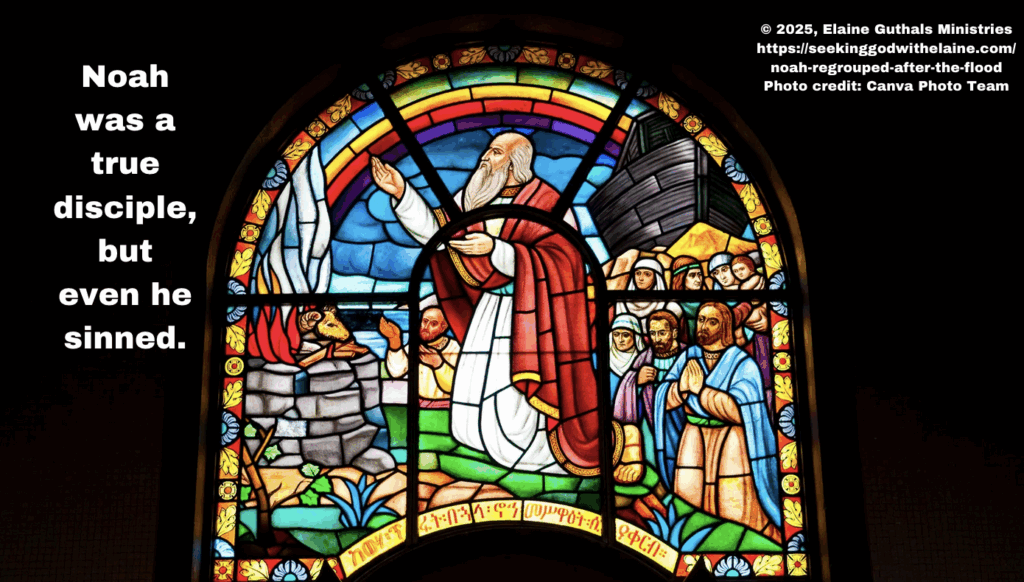
We tend to think that those walking with God won’t sin. Wrong. They are still in physical bodies with the sinful nature still intact.
Paul warned us about this. “If you think you are standing strong, be careful not to fall” (I Cor. 10: 12 NLT).
Doesn’t it comfort us that the Hall of Famers could still sin and be forgiven by God? God still used them even when they were flawed by sin.
Satan sabotages us enough with thinking we have sinned too badly that God would never forgive us. He would be wrong.
God had no problem with Noah becoming a grape farmer. He had no problem with him becoming a wine maker — and He even had no problem with him sampling his product.
- “You cause grass to grow for the livestock and plants for people to use. You allow them to produce food from the earth — wine to make them glad, olive oil to soothe their skin, and bread to give them strength” (Ps. 104: 14-15 NLT).
- “When you arrive, you may use the money to buy any kind of food you want — cattle, sheep, goats, wine, or other alcoholic drink. Then feast there in the presence of the Lord your God and celebrate with your household” (Deut. 14: 26 NLT).
- “And Melchizedek, the king of Salem and a priest of God Most High, brought Abram some bread and wine” (Gen. 14: 18-20).
Not only did Jesus talk about wine in the Parable of the Prodigal Son, but He also said He sampled the drink. “For John didn’t spend his time eating and drinking, and you say, ‘He’s possessed by a demon.’ The Son of Man, on the other hand, feasts and drinks, and you say, ‘He’s a glutton and a drunkard, and a friend of tax collectors and other sinners!’ But wisdom is shown to be right by its results” (Mt. 11: 18-19 NLT).
We are told in several verses that drunkenness is a sin.
- “Don’t be drunk with wine, because that will ruin your life. Instead, be filled with the Holy Spirit, singing psalms and hymns and spiritual songs among yourselves, and making music to the Lord in your hearts” (Eph. 5: 18-19 NLT).
- “I meant that you are not to associate with anyone who claims to be a believer yet indulges in sexual sin, or is greedy, or worships idols, or is abusive, or is a drunkard, or cheats people. Don’t even eat with such people” (I Cor. 5: 11 NLT).
- “He must not be a heavy drinker or be violent. He must be gentle, not quarrelsome, and not love money” (I Tim. 3: 3 NLT).
- “In the same way, deacons must be well respected and have integrity. They must not be heavy drinkers or dishonest with money” (1 Tim. 3: 8 NLT).
Fuller said something interest as to why drunkenness is a sin. He wrote,
“Drunkenness is a sin which involves in it the breach of the whole law, which requires love to God, our [neighbors] and ourselves. The first as abusing His mercies; the second as depriving those who are in want of them of necessary support, as well as setting an ill example; and the last as depriving ourselves of reason, self-government, and common decency. It also commonly leads on to other evils. It has been said, and justly, that the name of this sin is Gad — a troop cometh!
Resource
I looked at the end of that quote and thought I made a typo. But since I cut and pasted it, that wasn’t the case.
Fuller was making a reference to what Jacob’s son’s name meant. “And Leah said, A troop cometh: and she called his name Gad” (Gen. 30: 11 NLT).
Back to drunkenness.
Oh, I got the lose self-control part. That means God isn’t in control of us.
- “Don’t be drunk with wine, because that will ruin your life …” (Eph. 5: 18-19 NLT).
- “For you are all children of the light and of the day; we don’t belong to darkness and night. So be on your guard, not asleep like the others. Stay alert and be clearheaded” (I Thess. 5: 6-7 NLT).
I even got the setting a bad example part. I know — at times — getting drunk means our trust in God has slipped.
I just never hooked it to the greatest commandments. “‘And you must love the Lord your God with all your heart, all your soul, all your mind, and all your strength.’ The second is equally important: ‘Love your neighbor as yourself.’ No other commandment is greater than these” (Mk. 12: 30-31 NLT).
The point is — post flood — sin was still in the world.
Dods questioned whether this was one of the first inward temptations Noah had experienced. I don’t see how that could be. Satan isn’t going to pass on tempting a righteous man — some think the only righteous man.
Resource
No one is immune to sin, even the most righteous person. Even when we are actively working as God calls us, we will still be tempted.
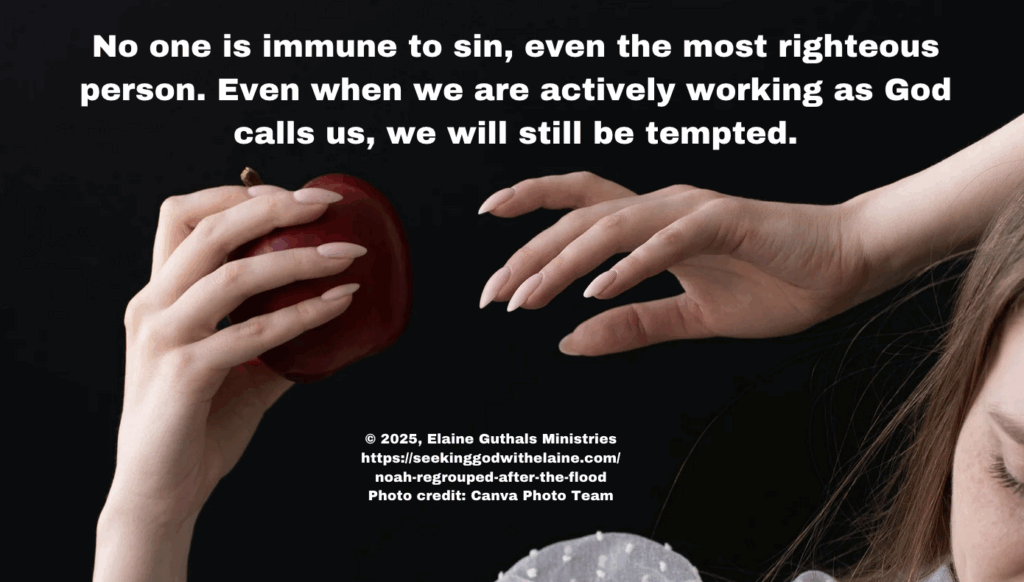
Was it Noah’s intention to get drunk? Maybe. Maybe not. Did he know of the effects of drinking too much? Maybe. Maybe not as it might have been the first time wine was ever made.
But just as the serpent in the Garden of Eden was cursed for being used by Satan, Noah had to suffer the consequences of his actions whether the drunkenness was intentional or not.
Making the Connections #1
Leale thought we should review our walk with God as a system of thought. I can see that.
Resource
We have to know God as well as ourselves and things. If we don’t really know God, we aren’t worshiping Him. That makes it just a religion, not a relationship.
But then, we also have to know ourselves. I haven’t said it in a while, but we need to constantly evaluate our lives to find the sin within us. That means constantly evaluating where we are at on the Sanctification Road.
Things is kind of a generic word. But since it is such a broad concept of what we have to know, we can’t really narrow the focus.
Plus, if there is a line between acceptable and being a sin (such as the line between drinking and drunkenness), we have to take that into consideration, also.
This knowledge is important because we have to bring it into our lives. We have to make God the focus. That is the only remedy that we can have for sin.
Making the Connections #2
Leale gave us a hint about how we are supposed to evaluate our lives. He wrote,
“The knowledge of spiritual truth must be expressed in duty, or man can have no religion. Doctrines are only valuable as they teach us how to live. Activity without contemplation has many evils, but united with it is the perfection of spiritual life. True thoughts of God and ourselves must be manifested in that energy by which we contend with evil, and perform our duty.”
Resource
Doctrine is a set of beliefs – in this case, God’s tenets. Knowledge of them alone is not good enough. We need to bring them into our hearts and have them change our lives.
If God’s doctrines don’t bringing us closer to Him, they are of no value to us.
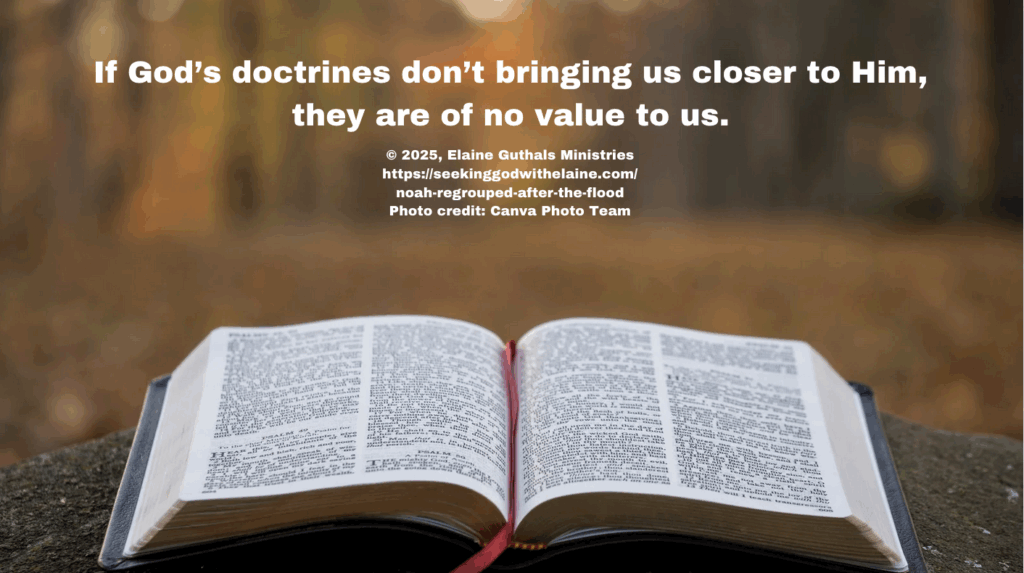
We have to contemplate what we are doing and why we are doing it. God’s Word calls it meditation.
- “Study this Book of Instruction continually. Meditate on it day and night so you will be sure to obey everything written in it. Only then will you prosper and succeed in all you do” (Josh. 1: 8 NLT).
- “But they delight in the law of the Lord, meditating on it day and night” (Ps. 1: 2 NLT).
- “I will study your commandments and reflect on your ways” (Ps. 119: 15 NLT).
- “Help me understand the meaning of your commandments, and I will meditate on your wonderful deeds” (Ps. 119: 27 NLT).
- “I remember the days of old. I ponder all your great works and think about what you have done” (Ps. 143: 5 NLT).
Did you catch that? Meditation = perfection. Yeah, it’s important.
How Do We Apply This?
- Make sure we are following God’s laws, not our rewrite of them.
- Always be in control of ourselves.
Father God. We are so sorry we let sin into the world. Thank You that You show us that even a righteous man like Noah sinned. May we always ask forgiveness when we sin. Thank You that Your forgiveness when we sin shows us how much You love us. Amen.
What do you think?
Leave me a comment below (about this or anything else) or head over to my Facebook group for some interactive discussion.
If you don’t understand something and would like further clarification, please contact me.
If you have not signed up for the email providing the link to the devotions and the newsletter, do so below.
If God has used this devotion to speak with you, consider sharing it on social media.